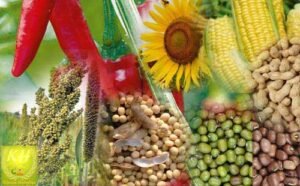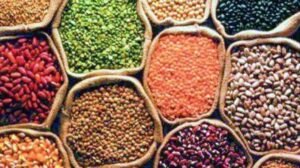The Union Cabinet has approved the increase in Minimum Support Prices (MSP) for 14 Kharif season commodities on June 19, including Paddy, Ragi, Bajra, Jowar, Maize, and Cotton, according to Information & Broadcasting Minister Ashwini Vaishnaw at a Cabinet briefing.

Union cabinet approves the highest increase came for oilseeds nigerseed and sesamum. The hike was by ₹983 and ₹632 and was fixed at ₹8,717 and at ₹9,267 per quintal, respectively.
Pulses like tur or arhar (pigeon pea) also benefited from a big MSP hike by about ₹550 from last year to stand at ₹7,550 per quintal.
The government aims to achieve self-sufficiency in pulses by 2027.
The MSP of paddy, the main kharif crop, has been raised by ₹117 to ₹2,300 per quintal for ‘common’ grade variety and to ₹2,320 for grade A.
pib.gov.in/PressReleaseIframePage.aspx?PRID=2026698
Under the chairmanship of Prime Minister Shri @narendramodi Ji, the Union Cabinet has approved the Minimum Support Prices (MSP) for Kharif crops for the 2024-25 marketing season. The most significant absolute increases in MSP are recommended for oilseeds and pulses.

This… pic.twitter.com/20CTTp6ND8
— Nitin Gadkari (@nitin_gadkari) June 19, 2024
The biggest absolute rise in MSP over the previous year has been recommended for oilseeds and pulses: Niger seed by Rs.983 per quintal, sesamum by Rs.632 per quintal, and tur/arhar by Rs.550 per quintal.
Apart from paddy, union cabinet fixed MSP for several other Kharif crops:

- Jowar Hybrid:
- MSP: ₹3,371 per quintal (an increase of ₹191 from the previous season).
- Ragi:
- MSP: ₹4,290 per quintal (an increase of ₹444).
- Tur/Arhar (Pigeon Pea):
- MSP: ₹7,550 per quintal (an increase of ₹550).
- Moong (Green Gram):
- MSP: ₹8,682 per quintal (an increase of ₹124).
- Groundnut:
- MSP: ₹6,783 per quintal (an increase of ₹406).
- Sesamum (Til):
- MSP: ₹9,267 per quintal (an increase of ₹632).
Minimum Support Price (MSP) has a significant impact on farmers in India:

- Price Assurance: MSP ensures that farmers receive a minimum price for their crops, even if market prices fall. This provides a safety net and encourages agricultural production.
- Income Stability: By guaranteeing a fixed price, MSP helps stabilize farmers’ income. It allows them to plan investments, repay loans, and meet household expenses.
- Crop Choice: MSP influences farmers’ decisions on which crops to cultivate. Higher MSP for certain crops may lead to increased cultivation of those crops.
- Higher Earnings: With increased MSPs, farmers receive better prices for their produce. This directly contributes to higher earnings.
- Risk Mitigation: MSP acts as a safety net. Even if market prices fall, farmers can sell their crops to government agencies at the MSP, reducing income risks.
- Investment and Production: Assured MSP encourages farmers to invest in better seeds, fertilizers, and technology, leading to increased production and income.
- Debt Reduction: Improved income helps farmers repay loans and reduce debt burden.
- Livelihood Security: MSP ensures a stable livelihood for farmers, especially during challenging seasons.
MSP increase approved by union cabinet plays a crucial role in supporting farmers’ livelihoods, but its impact varies based on crop-specific dynamics and implementation effectiveness. These MSPs aim to provide fair prices to farmers and support agricultural sustainability.












